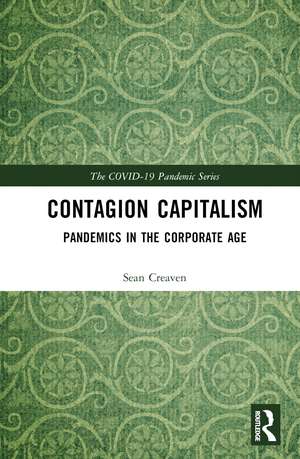Contagion Capitalism: Pandemics in the Corporate Age: The COVID-19 Pandemic Series
Autor Sean Creavenen Limba Engleză Hardback – 15 dec 2023
Contagion Capitalism therefore critiques the institutionalized corporate-capitalist control of the economy, the state, and science, and the grave consequences this has on global public health policy, the ecological crisis of sustainability, and zoonotic pandemic events such as COVID-19. In doing so, this book addresses the failings of what may be termed as “state science” or “establishment science” in managing the pandemic, as personified especially by those elements of the scientific elite placed in the service of the neoliberal state. This book also explores the limitations of corporate pharmacological technoscience in safeguarding public health, arguing that “Big Pharma” offers only partial remedies for problems of human illness and well-being, poses its own dangers to public health, and obfuscates the social bases of public ill-health and of pandemic risk. Contagion Capitalism further argues that COVID-19 will not be the last or even the most dangerous such epidemiological event. This is because the social production and global dissemination of zoonotic diseases is integral to contemporary capitalism, by virtue of its instrumental mode of science, its central dynamic of production for the sake of accumulation, and the consumer mode this sustains as its own condition of existence. These are the drivers of what may be termed as zoonotic accelerationism.
Contagion Capitalism will appeal to scholars in the humanities and social sciences with interests in neoliberal ideology and global political economy, and their impact upon social, political and cultural life.
Din seria The COVID-19 Pandemic Series
-
 Preț: 285.79 lei
Preț: 285.79 lei -
 Preț: 279.99 lei
Preț: 279.99 lei -
 Preț: 302.65 lei
Preț: 302.65 lei -
 Preț: 303.89 lei
Preț: 303.89 lei -
 Preț: 287.83 lei
Preț: 287.83 lei -
 Preț: 311.62 lei
Preț: 311.62 lei -
 Preț: 287.82 lei
Preț: 287.82 lei -
 Preț: 303.89 lei
Preț: 303.89 lei -
 Preț: 279.51 lei
Preț: 279.51 lei -
 Preț: 326.49 lei
Preț: 326.49 lei -
 Preț: 198.45 lei
Preț: 198.45 lei -
 Preț: 287.53 lei
Preț: 287.53 lei - 18%
 Preț: 997.42 lei
Preț: 997.42 lei -
 Preț: 352.41 lei
Preț: 352.41 lei - 5%
 Preț: 273.38 lei
Preț: 273.38 lei -
 Preț: 382.18 lei
Preț: 382.18 lei - 18%
 Preț: 944.87 lei
Preț: 944.87 lei -
 Preț: 353.02 lei
Preț: 353.02 lei - 18%
 Preț: 894.66 lei
Preț: 894.66 lei - 18%
 Preț: 1008.86 lei
Preț: 1008.86 lei - 18%
 Preț: 1066.55 lei
Preț: 1066.55 lei -
 Preț: 310.84 lei
Preț: 310.84 lei
Preț: 1006.43 lei
Preț vechi: 1227.35 lei
-18% Nou
Puncte Express: 1510
Preț estimativ în valută:
192.64€ • 209.32$ • 161.92£
192.64€ • 209.32$ • 161.92£
Carte tipărită la comandă
Livrare economică 21 aprilie-05 mai
Preluare comenzi: 021 569.72.76
Specificații
ISBN-13: 9781032567990
ISBN-10: 1032567996
Pagini: 324
Ilustrații: 1 Tables, black and white
Dimensiuni: 156 x 234 x 19 mm
Greutate: 0.63 kg
Ediția:1
Editura: Taylor & Francis
Colecția Routledge
Seria The COVID-19 Pandemic Series
Locul publicării:Oxford, United Kingdom
ISBN-10: 1032567996
Pagini: 324
Ilustrații: 1 Tables, black and white
Dimensiuni: 156 x 234 x 19 mm
Greutate: 0.63 kg
Ediția:1
Editura: Taylor & Francis
Colecția Routledge
Seria The COVID-19 Pandemic Series
Locul publicării:Oxford, United Kingdom
Public țintă
PostgraduateNotă biografică
Sean Creaven is Senior Lecturer in Sociology and Criminology at the University of the West of England, UK. His research interests include the sociology of modernity and postmodernity, sociological theory, critical theory, Marxism and Post-Marxism, critical realism, and criminological theory. He is the author of The Pandemic in Britain: COVID-19, British Exceptionalism and Neoliberalism (Routledge, 2023), Against the Spiritual Turn: Marxism, Realism, and Critical Theory (Routledge, 2010), Emergentist Marxism: Dialectical Philosophy and Social Theory (Routledge, 2007), and Marxism and Realism: A Materialistic Application of Realism in the Social Sciences (Routledge, 2000).
Cuprins
Introduction 1 Neoliberalism and zombie capitalism 2 Pandemics, instrumental reason, and corporate science 3 Zombie capitalism and the ecological crisis 4 Epidemiological rift: From zombie capitalism to contagion capitalism Conclusion
Descriere
Contagion Capitalism situates the COVID-19 pandemic within the systems of global political economy and their attendant cultural modes and theorizes that these systems act as facilitators and drivers of global pandemic risk.
